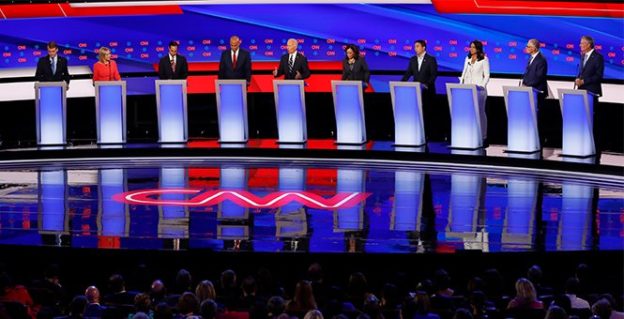NEW COLUMN IS “Democratic Dystopia: End Anglo-America, Welcome the World, Evict the Unborn.” It’s on Townhall.com. Longer (and funnier) versions are on WND.COM and The Unz Review.
An Excerpt:
How does one distill the worldview of the Democrats vying for their party’s presidential nomination?
Outrace each other on racial righteousness?
End Anglo-America? Welcome The World? Evict the unborn? Speak Spanish; English is your second language?
All the above—and worse.
On display, again, during the second in a series of Democratic primary debates were the racial (read anti-white) dynamics.
Genial and meek uncle Joe Biden bowed and scraped to his multicultural rivals, whereupon they set upon him like a flash mob; a multicultural mugging, Pat Buchanan called it.
Race—more accurately, anti-white politics—is the Democrats’ central cri de coeur. They have no other passion other than hounding and excommunicating others for what are thought crimes—for thinking, speaking or tweeting in politically unpleasing ways.
But practicing ageism gives these social-justice warriors no pause. There’s no social justice for the aged in Democratic politics.
Leading the purge of the party’s elders was Eric Swalwell, a nasty bit of work who had mercifully dropped out after the first round of debates, late in June. At the time, Swalwell had called on older Democrats to “pass the torch.” “[I]t’s time to pass the torch to a new generation of Americans.”
“If we are going to solve the issue, pass the torch. If we are going to solve climate chaos, pass the torch. If we want to end gun violence and solve student debt, pass the torch.”
Swalwell obviously imagined such ugly sloganeering was a winning strategy. And who can blame him? However, other than a writer for the cause at The Atlantic, the representative from northern California galvanized nobody with his call to expunge Democrats in their dotage. (“The Millennial Left Is Tired of Waiting,” intoned said writer. That magazine is packed with verbally incontinent Millennials, all poised to torch deviationists.)
Mr. Nasty is gone, and Democratic voters are, so far, sticking with the safe bet: Looks like the party that habitually blackens white America is hoping the next U.S. president is an old, white American.
Are these hypocrites suggesting that there’s something confidence-inspiring about this much-maligned cohort?
The women on the stage, the lovely Tulsi Gabbard and the well-mannered Marianne Williamson excepted, alternated between the roles of shrew, scold and bully (of old, white men, naturally).
Following Kamala Harris’ lead, the insufferable Kirsten Gillibrand mooed about an old Biden op-ed in which he had warned that women entering the workforce would imperil the family. Who will write the chapter about women like Gillibrand who enter politics and imperil the nation?
For comedic relief, consider the choreography that must have gone into positioning the oddball candidates, striding onto the Fox Theater stage in Detroit. One could hardly place mini-man Pete Buttigieg—boy, has the military lowered its physical requirements—alongside candidates who’d stare down at tiny Pete from vertiginous heights.
Height, however, did nothing to increase a tall Democrat’s stature. The group’s pathological, self-immolating progressivism was the great leveler, although an unspoken pack hierarchy was certainly apparent among the candidates. Naturally, that pecking order was racial.
… READ THE REST. NEW COLUMN IS “Democratic Dystopia: End Anglo-America, Welcome the World, Evict the Unborn.” It’s on Townhall.com. Longer (and funnier) versions are on WND.COM and The Unz Review.



